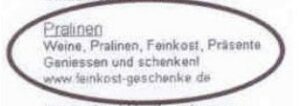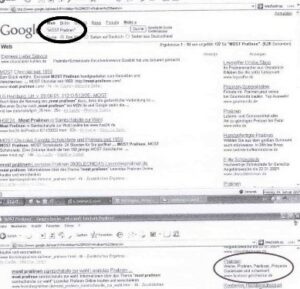Infringement by way of Google Ads – MOST chocolates
German Law
The case: A retailer booked a small ad via Google Ads in Germany, with the headline ‘Pralines’ and the text ‘Wines, Pralines, Delicacies, Gifts. Enjoy and give!’ This was followed by the Internet address of his online shop.

He entered the keyword ‘Pralines’ as the search term, so that his ad could be found on Google. He did not book any of the keyword options offered by Google such as ‘Broad match’, ‘Phrase match’ or ‘Exact match’.
Google nevertheless added the option ‘Broad match’ to his keyword. This option is invoked automatically whenever the advertiser does not specify a keyword option. The option ‘Broad match’ adds many more terms to the keyword list that match the specified keywords. This increases the range of the ad and at the same time makes the work of the advertiser easier. They no longer have to think of all the possible terms that Internet searchers might enter when searching for their products.
However, in the present case the search terms supplemented by Google also included the brand MOST of a manufacturer of high-quality confectionery and chocolate products. The retailer was unaware of this. Those who then searched for the chocolate manufacturer’s products and entered its brand MOST in the search engine also saw in the right column next to the hit list the Google Ad of the retailer and, when clicking on the link in the ad, were even directed to his Internet shop, even though they had searched for the brand products.

Of course, the chocolate manufacturer saw this Google Ad as a trade mark infringement. Two judicial instances also proved him right. However the Federal Supreme Court {BGH] dismissed the action. But the gift shop had done everything right according to German law. His ad appeared in a block clearly separated from the score list and was marked accordingly. In the ad there was neither the chocolate manufacturer’s trade mark, nor any reference to it, nor any reference to the chocolate manufacturer’s products. Instead, the ad described the promoted goods only with neutral generic terms such as ‘wines, chocolates, delicacies and gifts’. In addition, the link of his web shop in the ad was clearly different from that of the chocolate manufacturer.
Internet users who searched for the chocolate manufacturer’s products by entering its brand MOST in the search engine were therefore not deceived in Germany. They distinguished between the list of the matches and the ad and did not assume that the goods of the retailer originated from the trade mark proprietor or from an undertaking economically linked to him. This put the retailer in a favourable position in Germany.
Nevertheless, he must think laterally, because ads on Google.de are also seen abroad. They may also be challenged in court in other jurisdictions. In both Austria and France, it was assumed that in order to avoid deceiving the Internet user, the missing link between the trade mark owner and the advertiser must also be pointed out in the ad and no other indications of a connection between the two may be given, Federal Supreme Court (BGH), I ZR 217/10, MOST chocolates.
Learnings: If you embark upon online advertising and book a Google Ad, you should not place your trust only in the standard option ‘broad match’. In fact, you must also give careful thought to the specific design of your ad.